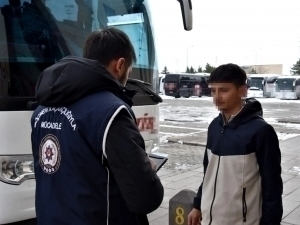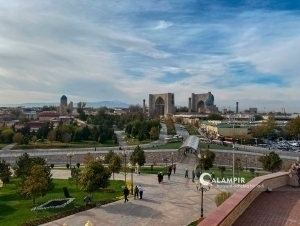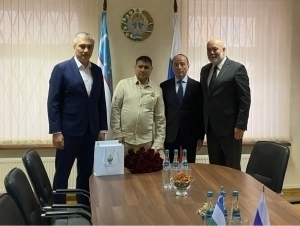No more blind loyalty: Rethinking Uzbek attitudes toward Russia
Review
−
11 June 2025 12726 7 minutes
On June 5, the 34-year-old dream of the Uzbek people came true: the national football team secured a place in the World Cup. The euphoria of that historic victory has yet to fade. However, in a country where millions of Uzbek migrant workers live and work—often subjected to inhumane treatment and systemic human rights abuses—celebrations are always short-lived. On June 8, Russian security forces carried out a raid targeting migrant workers at a facility belonging to the Ministry of Defense in Moscow. OMON officers stormed a dormitory in the Strogino district to check the documents of migrant workers. During the raid, men were forcibly dragged from their rooms. They were not simply removed—they were kicked, slapped, and punched, their dignity trampled and their humanity humiliated. In short, they became victims of neo-Nazi-style brutality. As a result of these inhumane actions, 5–6 individuals with documentation issues were detained and taken to the local police department for further investigation.
The first response came from the Representative Office of the Migration Agency under the Cabinet of Ministers of the Republic of Uzbekistan in the Russian Federation. The agency stated it was awaiting official information from Russian law enforcement and confirmed that both the Consulate General of Uzbekistan in Moscow and the agency itself had taken the situation under control. Representatives of the agency visited the victims and urged any other Uzbek citizens who were injured, mistreated, or otherwise affected to contact their hotline in Russia.
Later, official Tashkent took a firmer stance. Unlike previous incidents—such as the widely reported abuse in a Moscow bathhouse—this time the matter did not remain under wraps. Uzbekistan formally protested the actions of Russian security forces. A diplomatic note was sent to Russia demanding a legal assessment of the violations committed against Uzbek migrant workers. According to Ahror Burkhanov, press secretary of the Ministry of Foreign Affairs of Uzbekistan, on June 10, the Ministry held its regular monthly meeting with Russian officials to discuss migration issues. During the meeting, the Uzbek side expressed deep concern over reports of unauthorized searches, rude behavior, and disrespectful treatment of its citizens on Russian territory. It emphasized that such actions are incompatible with the spirit of friendly relations between the two countries and called for concrete measures to prevent such incidents from recurring. Uzbekistan urged Russia to comply with international human rights standards and ensure that Uzbek citizens are treated with dignity. The Uzbek Embassy in Moscow sent a formal note to the Russian Foreign Ministry requesting clarification and a legal response to the incident.
The Ministry of Foreign Affairs of Uzbekistan stated that it would keep the matter under close supervision and continue to take further diplomatic steps if necessary.
Against the backdrop of the recent tragic events, Sherzodkhan Kudratkhodja, Rector of the University of Journalism and Mass Communications of Uzbekistan, advised Uzbek youth not to travel to Russia. He made this recommendation in a Facebook post in which he attached a video showing the latest raids on migrants in Moscow and the brutal actions of Russian law enforcement against labor migrants. Kudratkhodja acknowledged that Uzbekistan, whose population is growing by nearly one million people annually, is compelled to send part of its workforce abroad, but he urged young people to seek alternatives to Russia.
"About a million people are born in Uzbekistan every year. Naturally, it is difficult for the Uzbek economy to provide regular employment for such a large number of people. This issue is not unique to us—it is common in many developing countries. When the population grows, exporting labor becomes a necessity. But I want to say to our youth—boys and girls—do not go to Russia. There, they will beat you, kick you, insult you. In Russia, you are not respected—on the contrary, they will humiliate you. And yet, you are doing the hardest jobs that their own people refuse to do, and this is the 'reward' you receive," the rector wrote.
According to him, those who end up going to Russia are often individuals who did not perform well in school or who lack vocational training, and as a result, they are willing to take on the most difficult and undesirable jobs. He added that this reality is poorly understood by the elite and officials in a country that either suffers from a labor shortage or is engaged in a war.
"My brothers, my friends—study, learn languages, acquire a skill. Countries like Germany, the United Arab Emirates, Japan, and South Korea are waiting for you! While Russian oligarchs freely extract their wealth from the country, our laborers—our 'black people'—are earning money through hard and exhausting work. But this means nothing to them! Just listen to the insults they use: 'monkey,' 's**t,' 'baran,' 'chern**\*opy,' 'churka'... It is extremely painful to hear such words," Kudratkhodja said.
According to official data from the Agency for Foreign Labor Migration, as of early this year, over 1.3 million Uzbek citizens have been granted labor migrant status abroad, with more than 600,000 of them residing in Russia. However, unofficial sources estimate that more than 3 million Uzbeks are working abroad, with approximately 1.5 million in Russia alone. In recent years, the Russian government's treatment of labor migrants—particularly those from Central Asia—has become increasingly harsh. Restrictions on migrants continue to grow. Notably, starting June 30, citizens from countries with which Russia has a visa-free regime must submit an electronic entry application before arrival. Those who fail to do so will be denied entry. One of the most notorious incidents of mistreatment occurred on April 10 this year, when Russian security forces treated Central Asian migrants inhumanely during a raid at the Bodrost bathhouse in Moscow. In response, the Kyrgyz Ministry of Foreign Affairs handed an official note of protest to the Russian ambassador in Bishkek, demanding action to prevent such abuses.
Following reports that the bathhouse was frequented primarily by Kyrgyz and Uzbek nationals, the Committee on International Affairs, Defense and Security of the Legislative Chamber of the Oliy Majlis of Uzbekistan submitted a formal request to Foreign Minister Bakhtiyor Saidov. The request asked what measures were being taken to protect the rights and legitimate interests of Uzbek citizens abroad. In connection with this, QALAMPIR.UZ contacted Ahror Burkhanov, Press Secretary of the Uzbek Foreign Ministry, to inquire whether Uzbek citizens had been detained during the Bodrost bathhouse raid. Burkhanov stated that the investigation was ongoing and promised that official information would be released soon. However, to date, the ministry has not made any public statement regarding the matter.
What drew further attention was the dismissive response of the Russian Foreign Ministry to Kyrgyzstan’s legitimate protest. Unfortunately, such a reaction is not unexpected. The remnants of imperial arrogance still linger behind the Kremlin’s walls. Commenting on the incident, the Russian Foreign Ministry claimed that foreign nationals had resisted law enforcement officers during the operation, and thus, the actions of the security forces were “appropriate.” In doing so, the ministry essentially justified the use of violence against migrants. Even more striking was the attitude of the Russian Ambassador to Kyrgyzstan, Sergei Vakunov. In an interview with TASS, he urged not to escalate the situation surrounding the raid, dismissing the concerns of Kyrgyz officials as merely “an emotional reaction.” These remarks—made while standing on Kyrgyz soil—appeared to trivialize the authority and concerns of a sovereign state.
Now the question remains: how will the Russian Foreign Ministry, under Sergei Lavrov—who has previously demonstrated disregard for Uzbekistan, beginning with his arrival in Samarkand—respond to the diplomatic note from Tashkent this time?
Live
All



